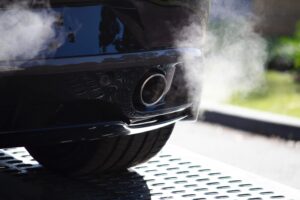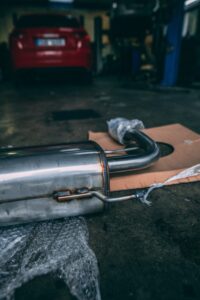7 signs your vehicle has a damaged exhaust system
Your vehicle exhaust is one of the hardest working systems in your vehicle. Comprised from a series of vital components, it contributes to a smooth driving experience as well as protecting your cabin from harmful engine emissions.
But with a lack of regular servicing, it’s not uncommon for drivers to see a plume of smoke in their rear-view mirror, often caused by a damaged gasket, corroded catalytic convertor, or worse.
For that reason, here’s a rundown on why your exhaust is important, and how to tell when it needs some urgent professional attention. Buckle up.
What is the purpose of an exhaust system?
An exhaust redirects harmful gases, such as carbon monoxide and hydrogen monoxide, from a controlled combustion in your engine to the rear of your vehicle.
As part of the redirection process, gases pass through a series of components where they’re converted into inert gases before being released into the atmosphere.
A typical exhaust system is made up of five components, namely a manifold, catalytic convertor, resonator, oxygen sensor and a muffler (silencer).
Because your exhaust system is under your vehicle, it is more susceptible to damage from gradual corrosion and contact with road surfaces, such as speed bumps.

How can I tell if my exhaust needs repairing or replacing?
Unlike some damaged vehicle components that might go unnoticed for months before a problem is detected, an exhaust system isn’t so subtle when it’s struggling. In most cases, you’ll likely experience:
Metallic vibrations and rattling
If your exhaust has come loose, you’ll hear a metallic rattling from within your cabin, often accompanied by a mild vibration felt through your seat, steering wheel or accelerator pedal.
Most often, a loose catalytic convertor is the cause of rattling, which, if left untreated, can damage neighbouring components and cause more strain on your pocket. If you hear rattling, get it checked as soon as possible.
Loud engine noise
Otherwise known as a ‘blown exhaust’, a loud engine noise is often caused by a cracked manifold or a worn-out gasket, both causing a great deal of decibels acting as a sign your exhaust needs attention.
If noise is detected from the rear of your vehicle, it could be the case that your silencer is damaged. If you’re unsure where the noise is coming from, feel free to book your vehicle in with us.
Reduced performance
If your exhaust is loose or leaking, you’ll likely experience a sharp decline in performance when you hit the accelerator pedal. Although you might be tempted to ignore the problem, you’re only costing yourself more money in the long run. If in doubt, get it checked out.
Hissing noise
A hissing or popping noise while the engine is running is usually caused by a higher-than-normal back pressure from within your exhaust system. This can lead to discolouration of exhaust ports which may appear burnt.
Decreased fuel efficiency
If your vehicle has a damaged exhaust, it means the engine needs to drain more fuel to achieve the same level of performance. In most cases, this is caused by a leaking exhaust which leads to false oxygen readings. The higher the oxygen reading, the more fuel being burnt.
Burning smell
Often accompanied by plumes of smoke, a burning smell is caused by heat from exhaust gases that burn neighbouring plastic components. If you smell burning, stop driving your vehicle and call for roadside assistance. Continuing to drive will more than likely damage other vehicle components, costing you more money on essential repairs.
Engine light
An illuminated engine light isn’t a sight welcomed by any driver. That said, it’s there for your safety and could be an early indication of an issue with your exhaust system. If you’re unsure why your engine light is illuminated, our technicians are on hand to identify and repair the cause.

Why is a healthy exhaust system important for your vehicle?
Although many exhaust systems are designed differently depending on age and model, they all perform the same four functions, namely to:
- reduce noise
- redirect fumes
- maintain vehicle performance
- improve fuel consumption
As part of your annual MOT, your technician will check your exhaust meets the above criteria by using specialist diagnostic equipment that measures noise and emission levels from your exhaust.
Is it safe to drive with a broken exhaust?
Driving with a broken exhaust can lead to harmful gases entering the cabin, as well as the environment. In extreme cases, excessive heat from a malfunctioning exhaust could become a fire risk, presenting a danger to you and other road users.
What to do if your vehicle has a damaged exhaust
If you’ve noticed any signs of a damaged exhaust, book a diagnostic test at your local garage. At C R Allen & Sons, we use specialist equipment to listen to your engine and identify the cause of the problem. Once the issue has been identified, we will advise you on whether a repair or replacement is necessary.